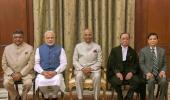The Supreme Court on Thursday said it would examine the legal issue arising out of the Nirbhaya gangrape and murder case on whether there could be separate hanging in a case where there are more than one death row convicts.

"The question is whether there can be separate hanging or whether it has to be simultaneous. We will go into it," said a three-judge bench headed by Justice R Banumathi.
The apex court said this while hearing an appeal filed by the Centre and the Delhi government challenging the February 5 order of Delhi high court which had said that the four Nirbhaya case convicts have to be executed simultaneously.
Solicitor General Tushar Mehta, appearing for Centre and Delhi government, told the bench that these convicts have taken justice delivery system for "a ride" and made a "mockery" of it by adopting delay tactics.
The execution of death warrants of these convicts have been deferred thrice so far due to delays by them in exhausting their legal remedies.
Mehta, who said "credibility of the system is at stake", informed the bench that a trial court has fixed March 20 as the date of execution of the four convicts who have exhausted all their legal remedies.
The bench, also comprising justices Ashok Bhushan and A S Bopanna, posted the plea for arguments on merits on March 23 and made it clear that no adjournment would be given.
About 30-minutes before proceedings commenced in the top court, a trial court here issued fresh warrants with March 20, 5.30 am, as the date for the execution of the convicts -- Mukesh Kumar Singh (32), Pawan Gupta (25), Vinay Sharma (26) and Akshay Kumar Singh (31).
During the arguments, Mehta said there was no statutory provision which stipulates that convicts have to be executed simultaneously and as per the law, only trial of a case has to be conducted simultaneously.
"Today, there are four convicts in this case. Tomorrow, there may be a case having 10 or 20 such convicts and they may again delay the execution by moving separate forums at different time," he said, referring to the tactics adopted by the convicts in the Nirbhaya case.
Mehta said pleas filed by Mukesh and Vinay against rejection of their mercy petitions by President has already been dismissed by the apex court.
"For Mukesh and Vinay, we should be permitted to execute them. There is no need to give any further time to them," he said, adding, "This is not our anxiety to hang somebody. No body like this. Our anxiety is that credibility of the system is at stake".
He said the two other convicts -- Akshay and Pawan -- will now file pleas in the top court challenging rejection of their mercy petitions and in this case, the authorities should be allowed to execute Mukesh and Vinay.
"It is de-humanising to keep them under such threat," Mehta said while referring to the fact that Mukesh and Vinay have already exhausted all their remedies.
When the bench said it would hear the matter on merits on March 23, Mehta said, "These convicts have taken the system for a ride. Please say that whosoever of them want to file for whatsoever remedy, they should do it before March 20".
To this, the bench said, "We will not say this. We will hear the matter on March 23".
At the outset, advocate M L Sharma, representing Mukesh, said he wanted to file a counter affidavit in the form of an application and raise some crucial issue related to the case of Mukesh.
"It (application) is frivolous and vexatious. Mr Sharma says that Mukesh was being represented by lawyer Vrinda Grover and she had not done her job in collusion with the state. I must say that Vrindr Grover has done her best in the case," Mehta told the bench.
Hearing Mehta's submission, Justice Banumathi said, "Mr Sharma, clients will come and go but your brother and sister colleagues will always be here. You cannot file a counter-cum-application. You can file counter affidavit only".
"It is uncharitable to make such remarks," the bench said.
During the arguments, Mehta said that the high court had on February 5 given one week to the convicts to exhaust all their remedies but the trial court kept on extending the date of execution without any jurisdiction.
"Once the high court said one week, the time can be extended by the high court or the Supreme Court. Trial court has no jurisdiction to extend the time," he said, adding that it was "disturbing".
Justice Bhushan said that trial court had to extend the date of execution as mercy petition of convicts were pending with the President at that time.
Advocate A P Singh, appearing for Vinay and Akshay, said that Tihar jail is totally silent about pending mercy plea of Akshay as the petition which was rejected by the President was "incomplete".
"Do not make a mockery of the system," Mehta told Singh.
At the fag end of hearing, Sharma claimed that Mukesh was "compelled" to file his curative petition in the top court despite the fact that there is no limitation on filing it.
The bench told Sharma that all curative petitions have already been rejected in the case.
A 23-year-old physiotherapy intern, who came to be known as 'Nirbhaya' (fearless), was gang raped and savagely assaulted in a moving bus in South Delhi on December 16, 2012. She had died after a fortnight.
Six people, including the four convicts and a juvenile, were named as accused. Ram Singh, the sixth accused, allegedly committed suicide in Tihar jail days after the trial began in the case.
The juvenile was released in 2015 after spending three years in a correctional home.












 © 2025
© 2025